June 28, 2016
$1 million Veritas gift funds summer research, nonprofit internships for nine students
By VICKI-ANN DOWNING
Thanks to a $1 million gift to Providence College, four students engaged in summer research with faculty in 2016, while five others received financial support to intern with nonprofit organizations.
The College used $600,000 from the gift to establish the Veritas Research Fund, which supports undergraduate students in research with faculty mentors, and $300,000 to establish the Veritas Distinguished Internships, which provide stipends for students working with nonprofits. Another $100,000 was donated to the PC Fund, which supports the College’s operational needs, including financial aid.
“Both these programs keep students engaged with their fields of study during the summer and give them wonderful learning experiences outside the classroom,” said the donor, who attended PC and wishes to remain anonymous. “I admire people who give their lives to working with nonprofits, especially in human services, and I’m very pleased to have been able to play a part in encouraging that at the College.”
The first four Veritas scholars received $4,000 stipends to assist them in their summer research. They were Meaghan Creamer ’17 (Syracuse, N.Y.), an elementary special education major; Joan Miller ’18 (Oakdale, Conn.), a music performance and art history double major; Blaine Payer ’18 (Fall River, Mass.), a philosophy major; and Kimberly Pena Maida ’17 (Marlborough, Mass.), a global studies major.
“Conducting research allows students to engage deeply with a topic they are passionate about, gain valuable academic and personal skills, and build lasting relationships with faculty mentors,” said Dr. Jennifer L. Van Reet, associate professor of psychology and chair of the Undergraduate Research Committee. “Students report that the process of creating new knowledge is one of the most exciting and rewarding experiences of their college careers. Not only does this donation allow the College to expand the number of meaningful research experiences it can provide students, it ensures that these opportunities will be available in perpetuity.”
The students who received $4,000 Veritas Distinguished Internship awards were Michael DeCapua ’17 (Wayside, N.J.), a biology and psychology double major; Sarah Hammond ’17 (Essex, Conn.), a biology and health policy and management double major; Elizabeth Longo ’17 (Bedford, N.Y.), a public and community service studies and global studies double major; Vania Pereira ’17 (Boston, Mass.), a global studies major; and Giancarlo Rivera ’18 (Westfield, N.J.), a health policy and management major.
“The Veritas Distinguished Internships program allows students to intern at non-profit organizations, where they gain professional experience and skills, as well as contribute to a cause,” said Patti Goff, assistant vice president for integrated learning and administration. “Without this funding, the students would likely have had to decline the internship opportunity, which would have been a loss for both the student and the nonprofit organization.”
Meaghan Creamer ’17: Analyzing classroom results from Italy
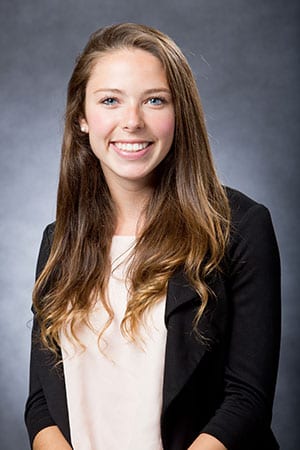
Creamer’s research was inspired by the semester she spent in Florence, Italy, in fall 2015, through the Elementary Special Education Diversity in Education program. She prepared and taught a lesson each week for fifth graders and also observed other PC students and an Italian teacher in their classrooms.
During the summer, she assessed whether being taught by American students helped the Italian children gain global competence. Creamer distributed a survey to the children developed by her faculty mentor, Dr. Laura B. Hauerwaus, associate professor of education. The survey asked what the students learned from their American teacher, whether that teacher taught differently, and whether the students liked the teaching methods.
Its main question was, “What did you learn about yourself as a global citizen?”
“There has been a lot of research done on how the global competence of American pre-service teachers is affected when they study abroad, but not too much on how children in the host countries are affected — specifically, how they grow as global citizens,” said Creamer.
At PC, the students’ responses were translated into English, then entered into a computer program that Creamer analyzed.
“As an education major, teaching those students helped me learn about differentiation in the classroom. I was working with English as a Second Language students, which is gaining importance in schools everywhere,” she said.
Joan Miller ’18: The compositions of Igor Stravinsky
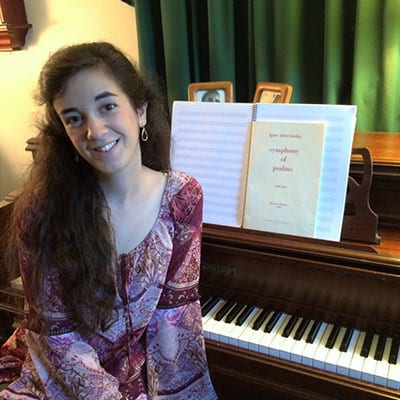
Miller has been drawn to the work of composer Igor Stravinsky since she sang his Symphony of Psalms with the Eastern Connecticut Symphony Orchestra in 2014. She spent the summer researching whether Stravinsky’s Catholic liturgical works may have been influenced by the chants he heard in the Russian Orthodox Church.
Miller traveled to libraries and archives, including Brown University, the Boston Symphony Orchestra archives, Yale University, and the Eastman School of Music at the University of Rochester in New York. To learn more about the nuances of Russian Orthodox chant, she talked with a Russian hymnographer in New York.
Then, with her faculty mentor, Dr. T.J. Harper, associate professor of music and director of choral activities and music education, she analyzed two works, Symphony of Psalms and Mass, to determine the extent to which they were influenced by Russian Orthodox chant.
“It’s highly probable that elements of Orthodox liturgy would have worked their way into Stravinsky’s style and come across in some of his most spiritually powerful compositions,” said Miller. “I’m looking forward to taking a closer look at some of my favorite of his compositions, while simultaneously indulging my love for music theory and analysis.”
Blaine Payer ’18: Economic conditions and zombie movies
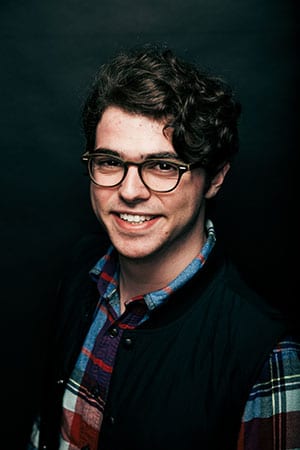
From the time he began watching movies with his dad, Payer recognized that films are much more than face-value entertainment. Like books, they teach about the culture and times of the period in which they were written.
For the summer, Payer’s focus was zombie movies. He studied a dozen films — from 1931’s White Zombie to 2013’s World War Z — to consider how the vampires and zombies in them symbolize the socio-economic conditions affecting prosperity.
“The 1930s, during the Great Depression, is when the era of the universal monster took off,” said Payer.
“Karl Marx, writing in the mid-19th century, used images like vampires and zombies to describe the capitalist economy and its potential to suck the life out of its victims. In the decade since the financial crisis, zombie movies have exploded in popularity. Zombies close in from all directions, leaving survivors with just about enough materials and resources to scrape by.”
Payer’s faculty mentor, Dr. Jeffrey Nicholas, associate professor of philosophy, studies film and pop culture as a reflection of society. Payer used scholarly articles and books from Nicholas to study the subject.
Kimberly Pena Maida ’17: Safe Driving Coalition campaign

Maida studied the Safe Driving Coalition’s campaign to gain undocumented workers the right to obtain driver’s licenses in Massachusetts. She compared the Massachusetts movement with CONECT, an interfaith organization that helped to pass the legislation in Connecticut.
“During the summer of 2015, I researched how the Safe Driving Coalition garnered support for the bill within the broader community — people who were not immigrants,” said Maida.
“It’s convincing people who aren’t directly impacted that is hard. I found that the coalition works to frame the issue in a way that’s compelling. They frame it as a public safety issue, an economic issue, a rights issue.”
Maida is a research assistant for her faculty mentor, Dr. Trina Vithayathil, assistant professor of global studies. She has interned with the Massachusetts Immigrant Refugee Coalition and spent a summer studying in India. She did a month-long independent research project in Mumbai with an organization that fights for rights for Muslim women.
“Global studies classes provoke you to think of things in ways that other classes don’t,” said Maida. “They have you step out of the sphere you’re in and look at things from a different perspective.”
Veritas interns gain experience in career fields
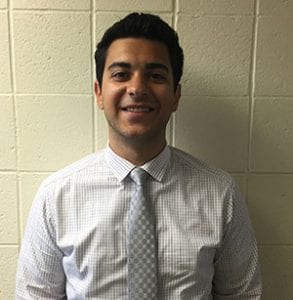
DeCapua worked as a volunteer research intern in the MIDAS Summer Student Program at Rhode Island Hospital in Providence. MIDAS — Methods to Improve Diagnostic Assessments and Services — is a clinical research study that integrates research assessment methods with routine clinical practice.
He observed diagnostic situations, attended weekly case conferences, researched publications, and entered patient information.
“I enjoyed my work,” said DeCapua. “I shadowed a neurologist-psychiatrist and worked with insurance companies.”
Hammond was a research assistant in the Loddenkemper Research Laboratory in the Department of Neurology at Boston Children’s Hospital. She assisted the clinical epilepsy research team in determining factors that contribute to pediatric epileptic encephalopathies and in investigating treatments.
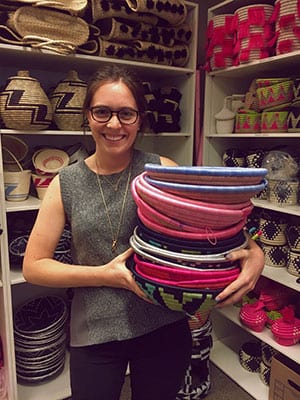
Longo was a studio assistant with Indego Africa in New York City. The social enterprise and lifestyle brand supports women in Rwanda and Ghana through economic empowerment and education.
Longo assists with packaging, shipping, post production, inventory management, and branding for the products crafted by local artisans.
“It’s great,” Longo said. “I learned so much, and I feel grateful to have received the scholarship so that I was able to take advantage of the opportunity.”
Pereira was a human rights intern with the Hawaii Institute for Human Rights in Honolulu.
She assisted with the coordination of human rights classes, fora, and conversations on college campuses and through the community; researched historic events and dates; and coordinated an exhibit on human rights issues today.
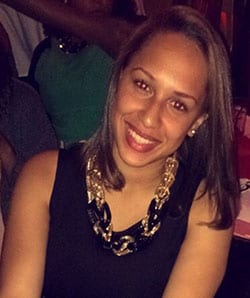
“Hawaii is the perfect place to do an internship on human rights,” Pereira wrote during the summer.
“Interning for the Hawaii Institute for Human Rights has helped me look at things from a different lens. It has helped me appreciate things that I take for granted in the mainland, such as food, clean water, and shelter, since a large Hawaiian population is stripped of those rights.
“I love Hawaii for its diversity and its approach on ways to live a healthy life and to take care of community,” Pereira added.
“I’ve learned about Hawaii’s rich history and culture. I look forward to another month of living in paradise.”
Without his Veritas scholarship, Rivera would not have been able to accept his internship in human resources at Holy Name Medical Center in Teaneck, N.J.
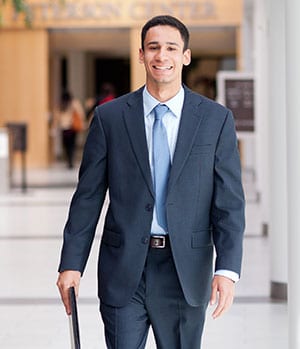
It cost Rivera $100 a week just to travel there — that’s $1,000 during a 10-week summer.
He found the position through PC’s Center for Career Education and Professional Development. His duties included human resources compliance, onboarding, employee benefits, employee relations, recruiting for positions within the hospital, and volunteer intern programming.
The president and CEO of Holy Name Medical Center is Michael A. Maron ’81, whose wife, four sons, and two brothers are PC alums.
“The lessons and real-world knowledge that I have obtained go far beyond anything that can be offered in a classroom setting,” said Rivera. “I am extremely grateful for the opportunities provided to me by the Center for Career Education and the PC alumni network.”





